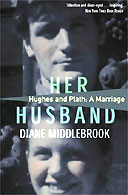
Her Husband
by Diane Middlebrook
Little, Brown £20, pp384
This admirable and judicious addition to the 19 competing biographies and 49 critical studies of Sylvia Plath and Ted Hughes currently listed is not so much another biography as a study of a literary construct: Hughes's presentation of himself as Sylvia Plath's husband in the context of his own editorial, critical and poetic oeuvre.
Diane Middlebrook's approach has the great merit of confining attention to what actually exists - words on paper - rather than on unrecoverable and unknowable concepts such as 'the truth' or 'the real Sylvia Plath'. Thus, it is fundamentally the story of Hughes as editor, redactor and interpreter, based principally on the two-and-a-half tons of paper he sold to Emory University in 1997.
Plath and Hughes are perhaps the most intensively mythologised couple of the 20th century, not least because they persistently interpreted their own actions in mythic terms. Hughes's basic understanding of his own creative process was that it was the gift of the 'White Goddess' as defined by Robert Graves, necessarily embodied in some actual woman; which made it peculiarly difficult for him to come to terms either with what the women in his life needed from him, or with Plath's independent creativity.
But while Hughes was nourishing his chthonic connection with the eternal Mother, Plath's mythos, by contrast, became increasingly Oedipal: she found that she needed to destroy the monster Daddy, and such trailing projections of him as an attraction to father-figures, a discrepancy between their respective needs which was driving a wedge between them by 1963 even without the involvement of extraneous factors.
Apart from these fundamental difficulties, some of the misunderstandings between the pair are tragicomic: Hughes signed up for a sibyl, but found that, at least some of the time, he had got a Martha Stewart; and unfortunately, British intellectuals in those pre-Elizabeth David days were robustly tolerant of squalor, discomfort and terrible food.
There was nothing in Hughes's background (or foreground) likely to give him the slightest sympathy with American-style home-making, and his coterie found Plath's domestic-goddess perfectionism more astonishing than anything else.
Middleton's exposition of the couple's life together maintains a dry, anthropological tone which suggests, with reason, that the premises on which they conducted their relationship are as remote as the lifestyle of the Flintstones.
However, one reference point which Plath and Hughes undoubtedly had in common was DH Lawrence, evident from their first meeting. Lawrence was an inescapable influence on Fifties Cambridge, but one of the most interesting things about Plath is that her private writings make it quite clear that she was simultaneously determined to fulfil Lawrentian agendas of wom anhood, and to have and care for children, while at the same time, she intended to be a genius to the top of her bent, a creative misreading of no mean order.
Though Middlebrook aims to tell the story of one marriage and its aftermath, her account does not conceal that being a husband was not Hughes's strong suit. To lose one partner to suicide might look like accident; to lose two looks, as Lady Bracknell said, like carelessness, but even after the death of Assia Weevil, Hughes continued repeatedly to be distracted from the reigning White Goddess by the next one to come along at the traditional interval of six to seven years.
With Birthday Letters (1998), Hughes recreated himself as the most Baroque representation of widowerhood since Sir Kenelm Digby, but this transmutation of experience into art, for all the painful immediacy of some of the poems, elides the fact that he had plenty else to cry about. While Plath haunts Hughes's oeuvre, as writer or revenant, other considerably more silent ghosts haunt this book, notably those of Weevil and Carol Orchard, women reduced to cipherdom by Hughes's mythologising of himself as Orpheus to Plath's Eurydice.
Hughes's awareness of the classical heritage is an inescapable fact of his work, witnessed by a number of distinguished translations, and he repeatedly pondered its treatment of marriage and death, so it is perhaps appropriate to think about the classical model for the last poem he published, 'The Offers', which recounts three consecutive visitations from Plath.
Middlebrook suggests that this poem is a key to Hughes's understanding of his mythic role as Plath's husband, his encounter with the White Goddess who is also his dead wife. But it is also a poem with a precedent, Propertius's guilt-ridden nightmare of his dead mistress's return (Elegies IV.7), in which Cynthia's ghost, among other things, demands,
And all those poems you have written around my name,
burn them for me, stop winning praise through me.
The differences between the two poems are instructive. Hughes voices none of Propertius's unease about making literary capital out of private passions. Furthermore 'The Offers' effectively says that without him, Plath's gift would not fully have surfaced; she would have fallen silent, or become a superficial, Europeanised American.
It is quite possible that he is correct, since the odds were grievously stacked against creative women in the 1950s, while conversely, Hughes's powerful, albeit erratic, talent, even if he had never met Plath, would have made him a respected English poet (though not earned him the vast sales he eventually achieved).
But the end of 'The Offers', in which the revenant Plath, on its/her third visitation demands, 'This time / Don't fail me', and blazing with vitality, takes possession of him, suggests that he had come to understand and interpret Plath as the voice of the Muse; and even perhaps to believe that in his work post-1963, he had expressed them both.
It is understandable that Hughes's thought-processes were not fundamentally shaped by the women's movement, but even in the first century BC, Propertius understood that it mattered who got to hold the pen. The mythical Orpheus was torn to bits by enraged women, a fate Hughes contrived to avoid, though one begins to wonder precisely how.

